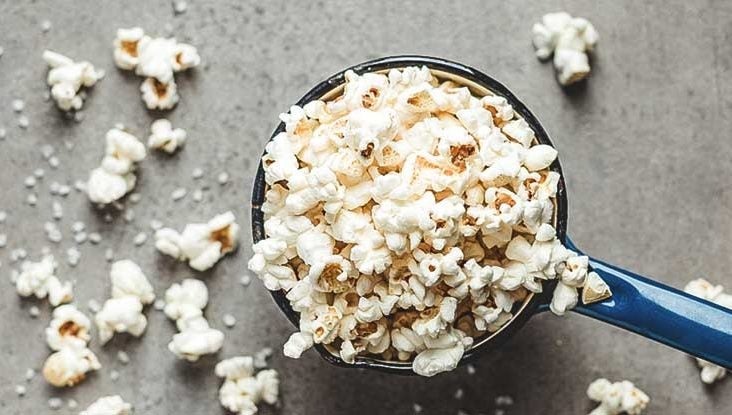Popcorn: Is it healthy? An Expert’s Opinion on Nutrition - Global Continent
Popcorn: Is it healthy? An Expert’s Opinion on Nutrition
Plus a few of her favorite brands.
Popcorn has changed from being viewed as a decadent movie theater treat to a healthy snack option. But is popcorn really good for you? The oil used to pop it, any spices applied, and perhaps even the corn kernels themselves, are the factors that determine the response.
First, Consider the Corn
Whole grains are a vital source of crucial vitamins, minerals, fiber, and disease-preventing antioxidants, and corn is one among them (even in its popped state). Because they include the complete grain, whole grains are also satisfying, in contrast to refined grains, which have been depleted of fiber and minerals. According to research, eating whole grains may increase lifespan, reduce inflammation, and reduce the risk of heart disease, stroke, cancer, diabetes, and obesity. Even a lower BMI and reduced abdominal fat have been associated with eating three daily meals of whole grains.
But one thing to consider is if your popcorn comes from a crop that was genetically altered. The unknown hazards associated with consuming GMO crops have several scientists and medical experts worried. Look for popcorn or kernels that are USDA Certified Organic (which guarantees they don’t contain GMOs) or goods with the “Non-GMO Project Verified” label if you choose to avoid GMOs.
The Oil
Examine the oil indicated in the ingredients before selecting a brand of bagged popcorn. The best oils are monounsaturated fats (MUFAs), particularly avocado oil and extra virgin olive oil, which are heart-healthy and anti-inflammatory.
Higher omega-6 fatty acid oils likely to have pro-inflammatory properties. Examples of these oils are maize oil, soybean oil, sunflower oil, safflower oil, and cottonseed oil.
Making your own popcorn on the stove gives you the option to use a high-MUFA oil or air-pop it using a hot air popper or a paper bag in the microwave, followed by a healthy oil mist. Also available are microwaveable popcorn brands like Quinn’s Just Sea Salt and Organic Popcorn that don’t use any oil.
The Seasonings
Lastly, think about the additions to your snack. The flavors on bagged popcorn may be as basic as sea salt and black pepper. Or the components might consist of regular dairy products like butter and cheese that isn’t made with grass-fed or organic milk. Sugar or other sweeteners are sometimes used to season certain popcorn (think kettle corn). Check to see exactly what is in the bag before you delve in.
If you are making your own popcorn, you may get creative with healthy toppings like cinnamon and cocoa powder, dried fruit without preservatives, nuts or seeds, Italian or chipotle flavor, turmeric, and black pepper. You may manage the amount of salt you use while making your own.
The Bottom Line
Despite the fact that the nutritional value of popcorn varies greatly, it may be a nutritious snack. I always choose organic or non-GMO popcorn that is seasoned with pink Himalayan salt or sea salt and cooked with extra virgin olive or avocado oil.
Make rich popcorn variants infrequent treats rather than daily fare if you enjoy them. Also, pay attention to portion quantities. The normal serving size for popcorn is three to three and a half cups, however, an entire bag may easily be consumed in one sitting. And that may have the same amount of carbohydrates as five pieces of bread. Additionally, the increased salt may result in fluid retention, which leads to bloating.



Post a Comment